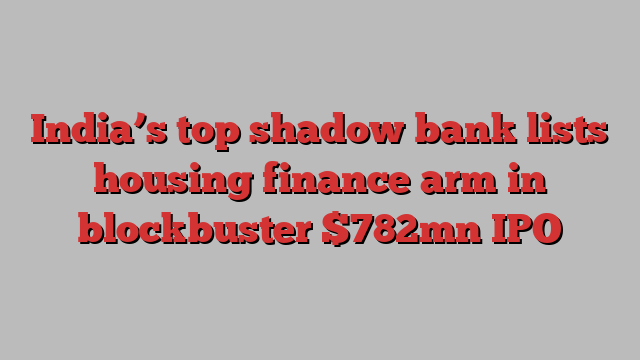
Stay informed with free updates
Simply sign up to the Indian business & finance myFT Digest — delivered directly to your inbox.
Bajaj Finance, India’s largest non-bank lender, floated its housing finance arm in the country’s biggest initial public offering so far this year, drawing strong investor interest due to buoyant property and equity markets.
Shares of Bajaj Housing Finance, one of India’s major mortgage providers, shot up by as much as 130 per cent to Rs161 during its trading debut on India’s stock exchanges on Monday after the $782mn offering drew bids for more than 64 times the shares offered last week.
Bajaj Housing Finance, part of the nearly century-old Bajaj Group which sells everything from scooters to insurance, has grown with the rapid expansion of India’s property market. The mortgage provider registered a 31 per cent annual increase of assets under management to Rs970bn ($12bn) in the quarter through to the end of June.
The listing comes after India’s central bank ordered a group of large non-bank lenders to go public by 2025 in an effort to enhance regulation of the sector.
Sanjiv Bajaj, chair of Bajaj Finserv, the family’s financial services holding company, told the Financial Times that regardless of the Reserve Bank of India’s rules it was a good time to list the company and diversify its funding.
Indian companies are enjoying heightened valuations in the country’s equity market, which is being driven to record highs by a rush of retail investors.
Bajaj said it was also an “open question” whether Bajaj Finance, which has $42bn in assets under management, would float its four-year-old brokerage business down the line.
The billionaire also sought to downplay concerns over a rise in bad loans, adding that a deterioration of personal loan credit quality following a boom in retail lending during the pandemic was temporary.
“It will come back within a manageable level and then it’ll grow from there again,” Bajaj said in an interview at the company’s headquarters in the western Indian city of Pune. “We’ve seen multiple such cycles over the last couple of decades.”
Over the past year, the RBI has warned over the breakneck growth of consumer loans and credit card debt, raising capital requirements late last year. Risk taking by the country’s non-bank lenders, which have fuelled India’s economic growth, sparked a credit crisis six years ago, leading to the collapse of Infrastructure Leasing & Financial Services.
While the central bank’s moves have cooled growth in unsecured lending, personal loan delinquencies climbed to 5.1 per cent in the last financial year from 3.9 per cent, according to Nomura estimates.
Bajaj Finance, the conglomerate’s $55bn market cap lending arm, has increased its customer base 21 per cent over the past year to 88mn customers.
But in the latest quarter ending in June it reported loan losses and provisions set aside to cover potential defaults were up 69 per cent annually to Rs16.85bn. Profit after tax rose 14 per cent on an annual basis in the quarter through June to Rs39bn.
The lender has been pruning back risky loans, including to retail customers in India’s vast rural hinterland whose economy has struggled to recover following the pandemic, and expects loan losses to come down by the end of the year.
“We saw slightly elevated stress levels in unsecured personal loans and we slowed down our growth over there,” Bajaj said. “The important thing is to take note of it, act on it and then go back to it when the times get better.”
Bajaj added that he was untroubled by heightened competition, including from other shadow lenders, such as Jio Financial Services, which was listed last year and is owned by rival Indian billionaire and Asia’s wealthiest tycoon Mukesh Ambani.
“We are still only 2 per cent of India’s credit and as a credit market we are expected to grow at 13 per cent to 15 per cent for the next many years,” Bajaj said. “We are not in saturated markets like the west.”